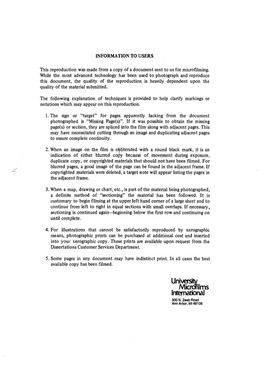| dc.contributor.author | Craig, Barbara June. | en_US |
| dc.date.accessioned | 2013-08-16T12:28:59Z | |
| dc.date.available | 2013-08-16T12:28:59Z | |
| dc.date.issued | 1983 | en_US |
| dc.identifier.uri | https://hdl.handle.net/11244/5186 | |
| dc.description.abstract | Similarly, these authors debunk the myth of the brave new future. In a fallen, "irremediably flawed" world there is a disjunction between past and present which prevents continuity of culture, ethics, traditions, and family lines. A fragmented historical perspective leaves man feeling estranged, disoriented, and adrift. The life force has become debilitated, and there is a total failure of regeneration, primarily because of such factors as sex role reversals, perversions, mental deficiencies, impotence, and suicide. Thus, formerly successful and powerful families become attenuated. | en_US |
| dc.description.abstract | Although Faulkner has been called a modernist because of his use of disjunctive irony and Garcia Marquez has been called a postmodernist because of his use of suspensive irony in the form of magic realism, this categorization fails to take into account Faulkner's extensive use of mediate irony, typical of the pre-modernists, and the fact that, irrespective of his magic realism, Garcia Marquez's characters never arrive at the postmodernists' felicitous acquiescence. Both Faulkner's and Garcia Marquez's visions are essentially entropic and primarily modernist. | en_US |
| dc.description.abstract | Using Alan Wilde's and D. C. Muecke's theories of irony in the twentieth century, of which the central irony is finite man's attempts to understand and control an infinite world, this dissertation looks at William Faulkner's and Gabriel Garcia Marquez's use of irony to reexamine the lapserian myth. In such novels as The Sound and the Fury, Sartoris, Light in August, The Unvanquished and especially Absalom, Absalom! and One Hundred Years of Solitude, these novelists elaborate an entropic vision which postulates that the world is winding down and society is reverting to chaos. Through an "ironic consciousness, " which characterizes modernist literature, they debunk the myth of a heroic past, the Civil War heroes and illustrious founding fathers in particular. Through the use of ambiguity, they create a tension of opposites, of love and hate, held in balance by paradoxical irony. The capricious and irrational fates have grown tired of such arrogant and willful men and have doomed them to extinction. | en_US |
| dc.format.extent | iv, 198 leaves ; | en_US |
| dc.subject | Literature, Latin American. | en_US |
| dc.subject | Literature, American. | en_US |
| dc.subject | Literature, Comparative. | en_US |
| dc.title | The ironic vision in the fiction of Gabriel Garcia Marquez and William Faulkner / | en_US |
| dc.type | Thesis | en_US |
| dc.thesis.degree | Ph.D. | en_US |
| dc.thesis.degreeDiscipline | Department of English | en_US |
| dc.note | Source: Dissertation Abstracts International, Volume: 44-11, Section: A, page: 3377. | en_US |
| ou.identifier | (UMI)AAI8404554 | en_US |
| ou.group | College of Arts and Sciences::Department of English | |
